
Fire in the Thatch is a 1946 detective novel E.C.R. Lorac, the pen name of the British writer Edith Caroline Rivett. It is the twenty seventh in her long-running series featuring Chief Inspector MacDonald of Scotland Yard. Originally published by Collins Crime Club, it was reissued in 2018 by the British Library Publishing as part of a group of crime novels from the Golden Age of Detective Fiction.

Murder of a Martinet is a 1951 detective novel by E.C.R. Lorac, the pen name of the British writer Edith Caroline Rivett. It is the thirty fifth in her long-running series featuring Chief Inspector MacDonald of Scotland Yard. It was published in the United States by Doubleday under the alternative title of I Could Murder Her.
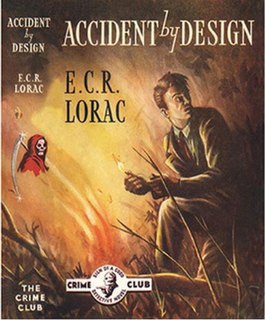
Accident by Design is a 1950 detective novel by E.C.R. Lorac, the pen name of the British writer Edith Caroline Rivett. It is the thirty fourth in her long-running series featuring Chief Inspector MacDonald of Scotland Yard. Like a number of Lorac's works it takes the form of a country house mystery, a popular branch of the genre during the Golden Age of Detective Fiction. Maurice Richardson in an review in The Observer wrote "The usual carefully constructed, rural family murder case which we expect from this eminently trustworthy exponent of the English school of whodunnit."

Murder in Vienna is a 1956 detective novel by E.C.R. Lorac, the pen name of the British writer Edith Caroline Rivett. It is the forty second in her long-running series featuring Chief Inspector MacDonald of Scotland Yard, one of the more conventional detectives of the Golden Age of Detective Fiction. It has an unusual foreign setting, post-war Vienna still occupied by the Allies, compared to the rest of the series which generally takes place in London or the English countryside. Maurice Richardson reviewing the novel for The Observer described it as the "usual solid job".
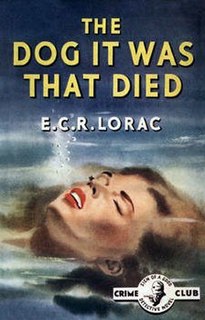
The Dog It Was That Died is a 1952 detective novel by E.C.R. Lorac, the pen name of the British writer Edith Caroline Rivett. It is the thirty sixth in her long-running series featuring Chief Inspector MacDonald of Scotland Yard, one of the more conventional detectives of the Golden Age of Detective Fiction. It was published by the Collins Crime Club.

Murder in the Mill-Race is a 1952 detective novel by E.C.R. Lorac, the pen name of the British writer Edith Caroline Rivett. It is the thirty seventh in her long-running series featuring Chief Inspector MacDonald of Scotland Yard, one of the numerous detectives of the Golden Age of Detective Fiction. It was released in the United States under the alternative title Speak Justly of the Dead. Originally published by Collins Crime Club, it was reissued in 2019 by the British Library Publishing as part of a group of crime novels from the Golden Age of Detective Fiction.

Crook O'Lune is a 1953 detective novel by E.C.R. Lorac, the pen name of the British writer Edith Caroline Rivett. It is the thirty eighth in her long-running series featuring Chief Inspector MacDonald of Scotland Yard, one of the more orthodox detectives of the Golden Age of Detective Fiction. It was published in the United States by Doubleday under the alternative title of Shepherd's Crook.
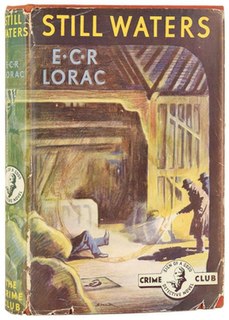
Still Waters is a 1949 detective novel by E.C.R. Lorac, the pen name of the British writer Edith Caroline Rivett. It is the thirty second in her long-running series featuring Chief Inspector MacDonald of Scotland Yard, one of the more orthodox detectives of the Golden Age of Detective Fiction.

The Murder on the Burrows is a 1931 detective story by E.C.R. Lorac, the pen name of the British writer Edith Caroline Rivett. Her debut novel, it introduced the character of Chief Inspector MacDonald of Scotland Yard who went on to appear in a lengthy series of novels during the Golden Age of Detective Fiction. Although initially named James this is changed to Robert in later books. It takes around Bideford Bay in North Devon where the author had spent several holidays.

Shroud of Darkness is a 1954 detective novel by E.C.R. Lorac, the pen name of the British writer Edith Caroline Rivett. It is the thirty ninth in her long-running series featuring Chief Inspector MacDonald of Scotland Yard, one of the more orthodox detectives of the Golden Age of Detective Fiction.

Let Well Alone is a 1954 detective novel by E.C.R. Lorac, the pen name of the British writer Edith Caroline Rivett. It is the fourtieth in her long-running series featuring Chief Inspector MacDonald of Scotland Yard, one of the more orthodox detectives of the Golden Age of Detective Fiction.

Rope's End, Rogue's End is a 1942 detective novel by E.C.R. Lorac, the pen name of the British writer Edith Caroline Rivett. It is the twenty first in her long-running series featuring Chief Inspector MacDonald of Scotland Yard, a Golden Age detective who relies on standard police procedure to solve his cases. It takes the form of the country house mystery, popular during the era.

Murder on a Monument is a 1958 detective novel by E.C.R. Lorac, the pen name of the British writer Edith Caroline Rivett. It is the forty fifth in her long-running series featuring Superintendent MacDonald of Scotland Yard, one of the more conventional detectives of the Golden Age of Detective Fiction. Along with Murder in Vienna it was one of the rare ventures abroad for the series which generally took place in London and rural England. It was penultimate novel featuring MacDonald to be published during Lorac's lifetime.
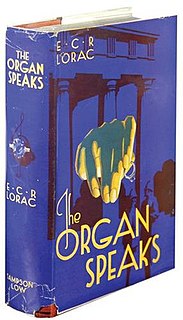
The Organ Speaks is a 1935 detective novel by E.C.R. Lorac, the pen name of the British writer Edith Caroline Rivett. It is the eighth book featuring Chief Inspector MacDonald of Scotland Yard who appeared in a lengthy series of novels during the Golden Age of Detective Fiction.

Crossed Skis is a 1952 detective novel by Carol Carnac, the pen name of the British writer Edith Caroline Rivett. It features the character of Inspector Julian Rivers of Scotland Yard, who appeared in fourteen novels by Carnac who under the name E.C.R. Lorac also wrote the better-known series featuring Chief Inspector MacDonald. Originally published by Collins Crime Club, it was reissued in 2020 by the British Library Publishing as part of a group of crime novels from the Golden Age of Detective Fiction.

Death of an Author is a 1935 detective novel by E.C.R. Lorac, the pen name of the British writer Edith Caroline Rivett. It is a rare standalone book by Lorac, not featuring Chief Inspector MacDonald of Scotland Yard who appeared in a lengthy series of novels during the Golden Age of Detective Fiction. It was her final novel published by Sampson Low before she switched to the more prestigious Collins Crime Club with whom she remained for the rest of her career.

A Pall for a Painter is a 1936 detective novel by E.C.R. Lorac, the pen name of the British writer Edith Caroline Rivett. It is the tenth in her long-running series featuring Chief Inspector MacDonald of Scotland Yard, a Golden Age detective who relies on standard police procedure to solve his cases.

Bats in the Belfry is a 1937 detective novel by E.C.R. Lorac, the pen name of the British writer Edith Caroline Rivett. It is the thirteenth in her long-running series featuring Chief Inspector MacDonald of Scotland Yard, a Golden Age detective who relies on standard police procedure to solve his cases. Lorac wrote it in the summer of 1936 while staying with her mother at Westward Ho! in North Devon. Originally published by Collins Crime Club, it was reissued in 2018 by the British Library Publishing as part of a group of crime novels from the Golden Age of Detective Fiction.
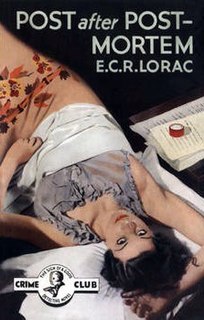
Post After Post-Mortem is a 1936 detective novel by E.C.R. Lorac, the pen name of the British writer Edith Caroline Rivett. It is the eleventh book featuring Chief Inspector MacDonald of Scotland Yard. Originally published by Collins Crime Club, it was reissued in 2022 by the British Library Publishing as part of a group of crime novels from the Golden Age of Detective Fiction.

Relative to Poison is a 1947 detective novel by E.C.R. Lorac, the pen name of the British writer Edith Caroline Rivett. It is the twenty ninth in her long-running series featuring Chief Inspector MacDonald of Scotland Yard, one of the detectives of the Golden Age of Detective Fiction who relies on standard police procedure to solve his cases..




















